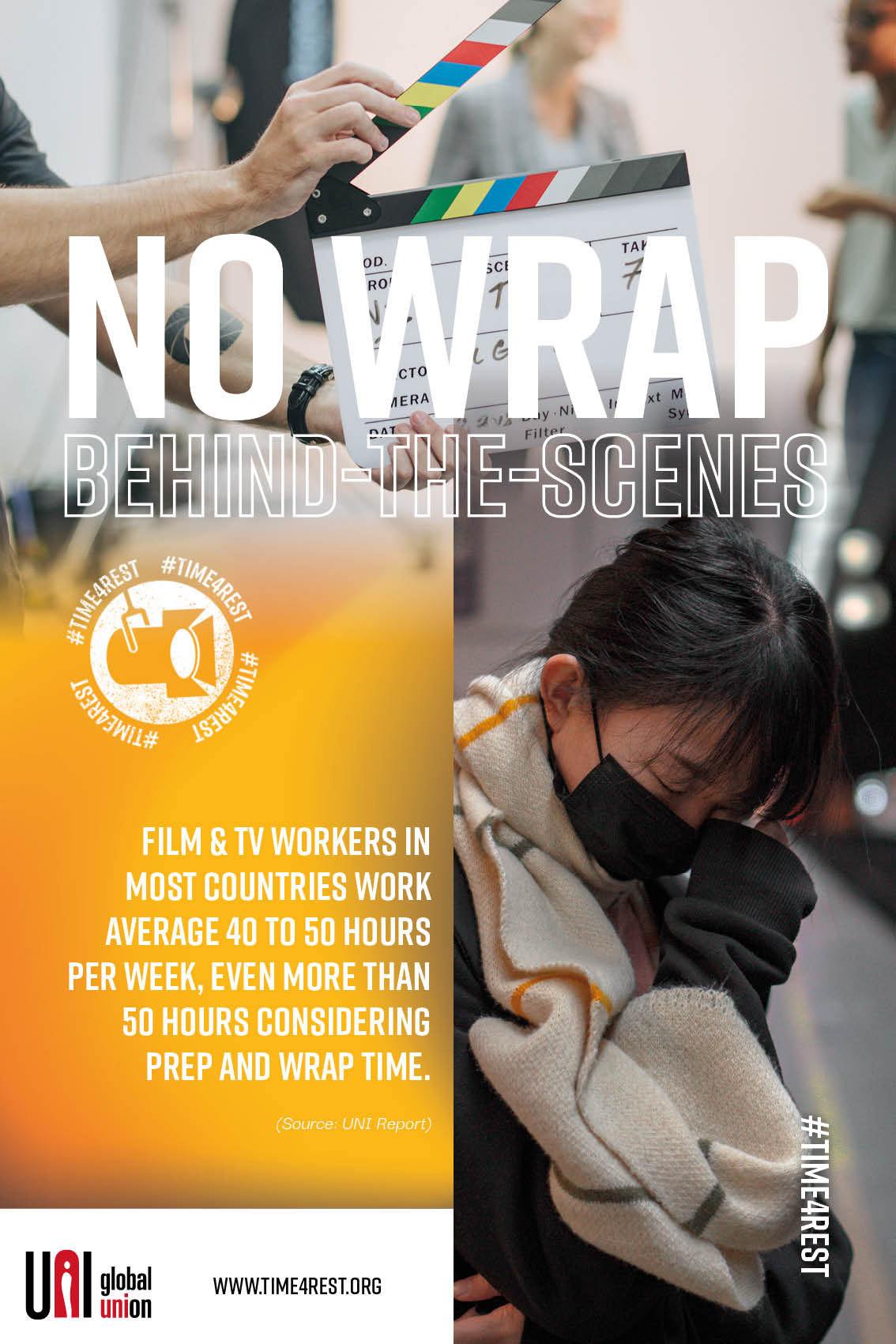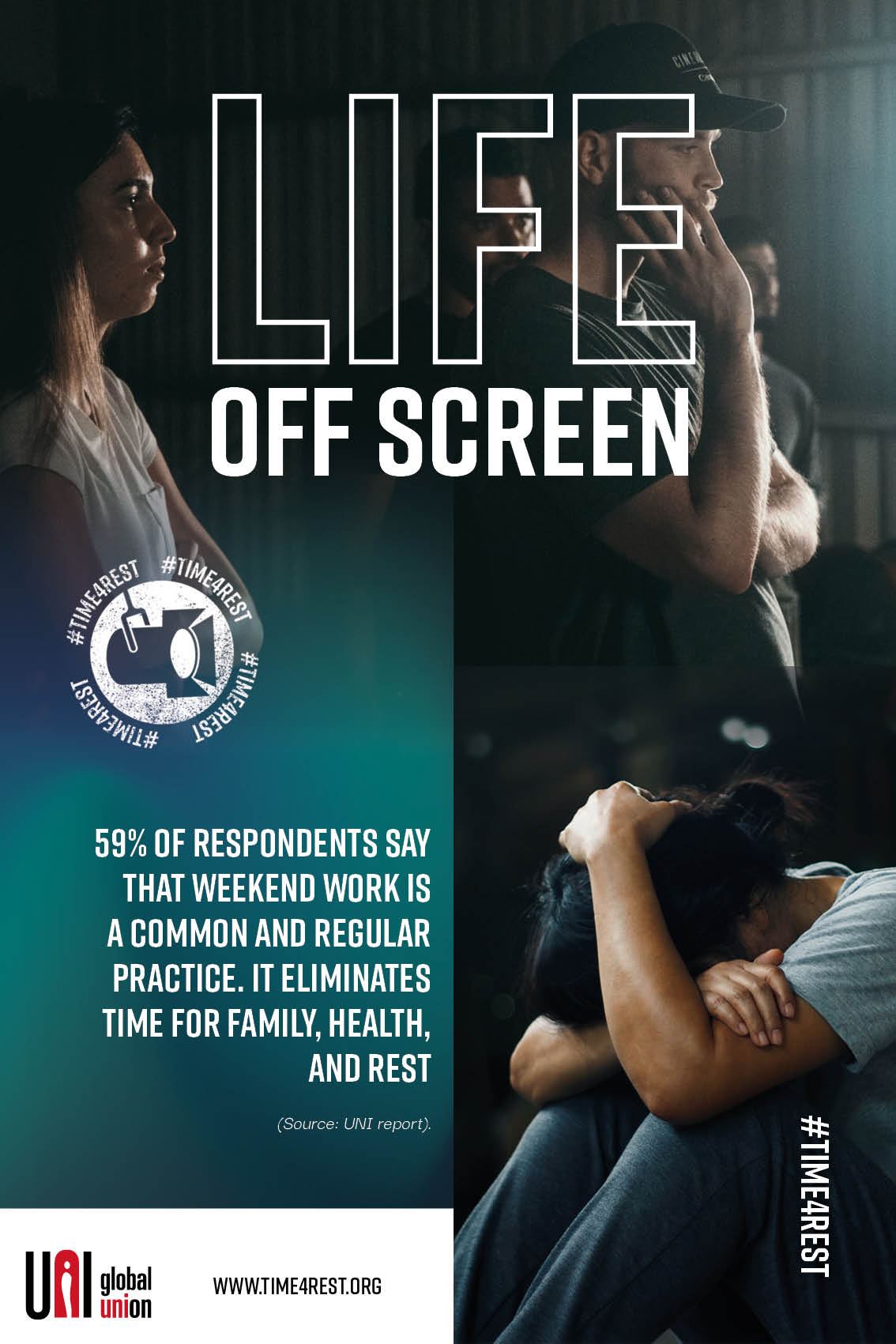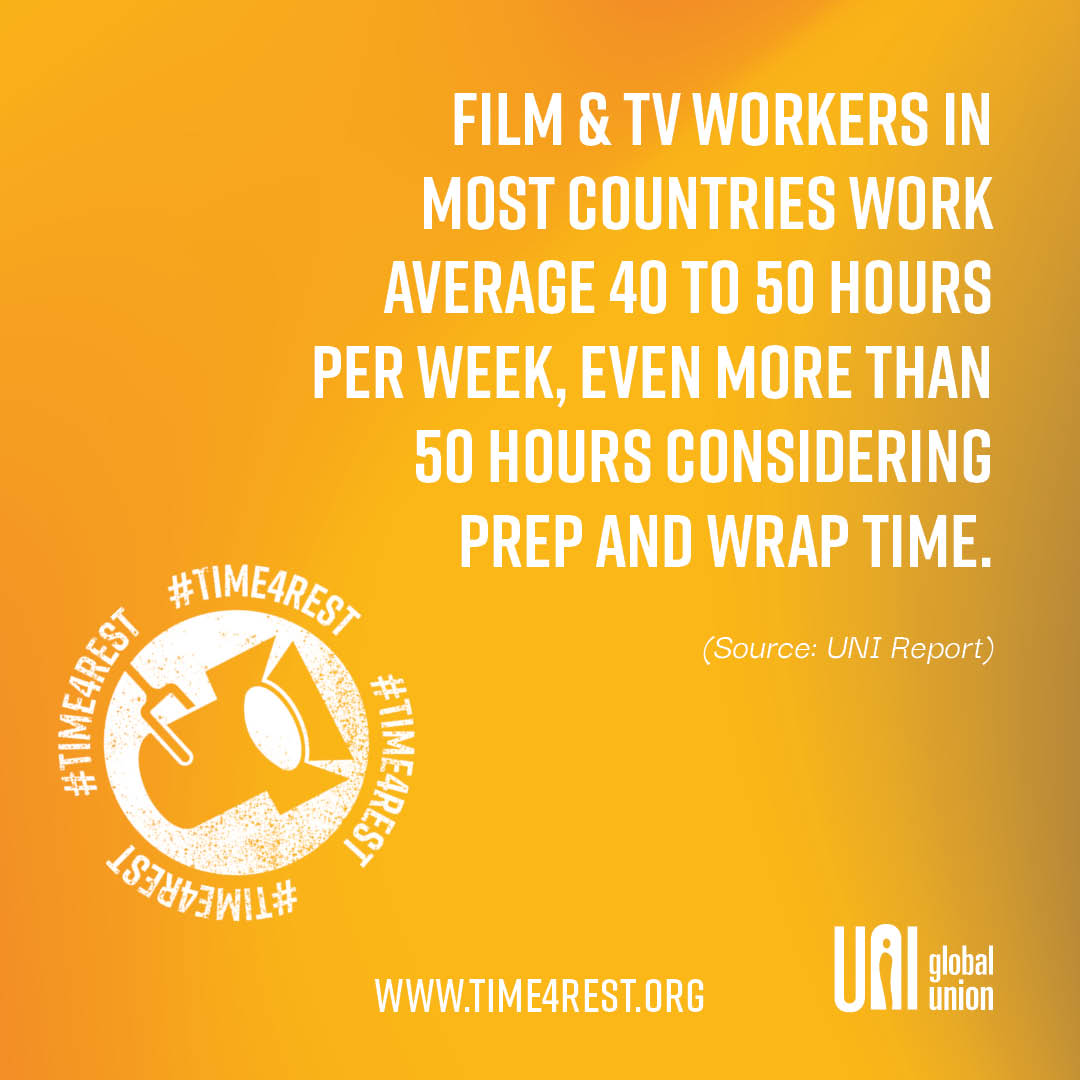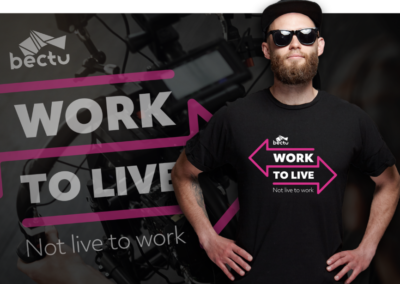Working
Hours
Wherever a film or TV production is taking place, working hours must comply with collective agreements and national laws. Production companies must respect rest periods and breaks in collective agreements and national laws.
Overtime must be voluntary, not required on a regular basis, and must always be compensated at a premium rate. Work-life balance policies must be implemented to promote better reconciliation of work and private life and include measures such as flexible working and job-sharing.
Mental
Health
Long hours are responsible for many stress and mental health issues. Research has found that stress resulting from overwork is destabilizing a person’s mental balance and can lead to grave long-term illnesses such as depression, anxiety and eating disorders. Stress related illnesses are increasing in our societies. Workers who are subject to excessive working hours have a much higher risk to encounter mental health issues.
The film and TV industry must invest in and further develop adequate resources for the mental health of workers and fostering a healthy workplace. Workplaces need to provide safe spaces to talk about mental health issues. Unions promote mental health training on how to deal with anxiety, stress and other disorders and provide capacity building for members to support colleagues who face mental health issues at work. We engage with members and employers to reduce the stigma around mental health by creating open spaces to talk about stress management and to create a workplace culture where workers feel more comfortable about voicing their concerns and needs.
Safety
at Work
Making crew work repeatedly long hours is a serious safety risk, on and off set. Reducing working hours and improving working time management make film and TV productions safer!
Employers must provide a safe and healthy work environment by conducting a risk assessment* and applying best measures to prevent accidents and injury to health arising out of, linked with, or occurring in the course of work. A health and safety senior management representative and a health & safety coordinator are to be appointed prior to start of production. Access to production by union representatives to assist members and workers is ensured. Workers shall receive regular and recorded health and safety training. All facilities and accommodation, where provided, shall be clean, safe, and meet the basic needs of the workers.
* FIAPF, CEPI, FIA, FIM and UNI MEI have jointly developed an Online Risk Assessment Tool for Audiovisual Productions in cooperation with the European Agency for Health and Safety at Work.
Work – Life
Balance
Forced to work regularly long hours including during weekends, many film and TV crew members are unable to sustain a family life and their own wellbeing. Weekend work is common in the global film and TV industry. It eliminates vital time for family, social activities, and rest. Good work-life balance policies and practices make the industry sustainable for workers and more productive for businesses. UNI recommends the implementation of work – life balance policies in all film and TV companies and productions, and promotes the making available a mix of various working arrangements that allow for flexibility in working time or the organization of work, such as:
• part-time working,
• job-sharing,
• reduced working hours,
• compressed working week,
• school term-time working,
• staggered or gliding hours,
• time-off and compensation systems,
• ad hoc home working,
• parental leave arrangements,
• career breaks and sabbaticals,
• childcare facilities.
Gender
Equality
A holistic gender equality approach is a prerequisite for a sustainable and fair working time management for all workers. Role time-related policies reduce existing gender inequality. UNI campaigns for making gender equality an integral part of the culture of the global film and TV industry. UNI recommends that productions implement a gender equality policy plan that includes measures to improve gender equality and commit to monitor progress made. Gender equality policies set clear targets and indicators. Indicators are regularly monitored and reported on. Recommended key elements of gender equality policies include:
• Appoint gender equality managers and/or gender equality task forces;
• Design and implement equality-based recruitment and promotion policies;
• Improve workplace flexibility for men and women;
• Promote flexible working/job-sharing;
• Build childcare/support for careers;
• Design and implement mentoring and sponsorship programmes;
• Organize gender equality training and awareness raising programmes;
• Elaborate, implement, and enforce a prevention
of violence and harassment policy.
Bullying and
Harassment
Employers who impose excessive long hours on workers making the acceptance of this environment a condition to obtain future work are bullying their workforce. A long hours culture leads to higher number of aggressions. Surveys confirm that departments where longest hours are worked, have more incidents of bullying and harassment. UNI advocates for industry policies to tackle and address bullying and harassment. Productions must have bullying reporting mechanisms and must put policies in place that ban abusive behaviour from the workplace. Unions and their representatives are supporting workers with advice, training, and information campaigns to contribute to prevention and are helping victims and witnesses of bullying and harassment.
Discrimination
and Exclusion
Imposing on crew to work long and certain hours, such as night and weekend work, can be indirect discrimination as it can have an unfair impact on some groups of workers, such as colleagues with disabilities, women who are pregnant or breastfeeding, or those commuting longer distances to studios or location. Employers must ensure that no person is subject to discrimination of any kind in employment. More flexible working hours, sustainable schedules and good working time management contribute to a productive workplace that is free of discrimination. UNI recommends that productions implement policies that include working time related measures to improve gender equality and diversity. Industry-wide diversity policies must aim to raise representation of under-represented groups on and off screen. Unions campaign for dignity at work policies that support enforcement of law, and the implementation of anti-discrimination industry policies including on bullying and harassment.
To avoid

Heart
Attack

Emotional
Damage

Car
Crashes

Family
Issues

Mental
Depression
Life off screen
“I’ve been on a lot of sets with insane schedules. The burnout is real, and it takes a massive toll on the crew”
“I have been so tired on that show that I cannot get out of the car when I arrive at work and feel like vomiting from tiredness. Working 15-hour days on set”
“I fell asleep whilst driving at the end of a seven-day week. Thankfully, I didn’t injure anyone else, but I suffered minor injuries myself”
“I have done overtime everyday with back-to-back weekends, Saturdays, and Sundays. I haven’t been to the movies with my kids in a long time”
Name Goes Here
time for





Campaign toolkit
rest







